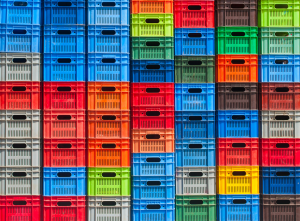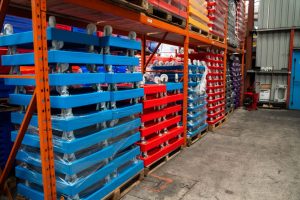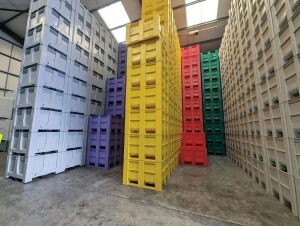There are many different types of food-grade storage containers but why is it important to use specific food-grade containers? We will unpack all of this and more, so you are well-informed about which storage is best for your business.
Plastic storage solutions can range in material, some of which may be toxic towards food and therefore shouldn’t be used for the handling or storage of consumables. This is also significant when you are considering your environmental impact.
In this blog, we will be discussing food-grade storage containers, catering food storage containers, wholesale food storage containers and food storage trays. Understanding the difference between all of these is important when considering how to store food and handle food safely.
But firstly, what are food-graded containers? Let’s take a look at the different materials and the grading of them.
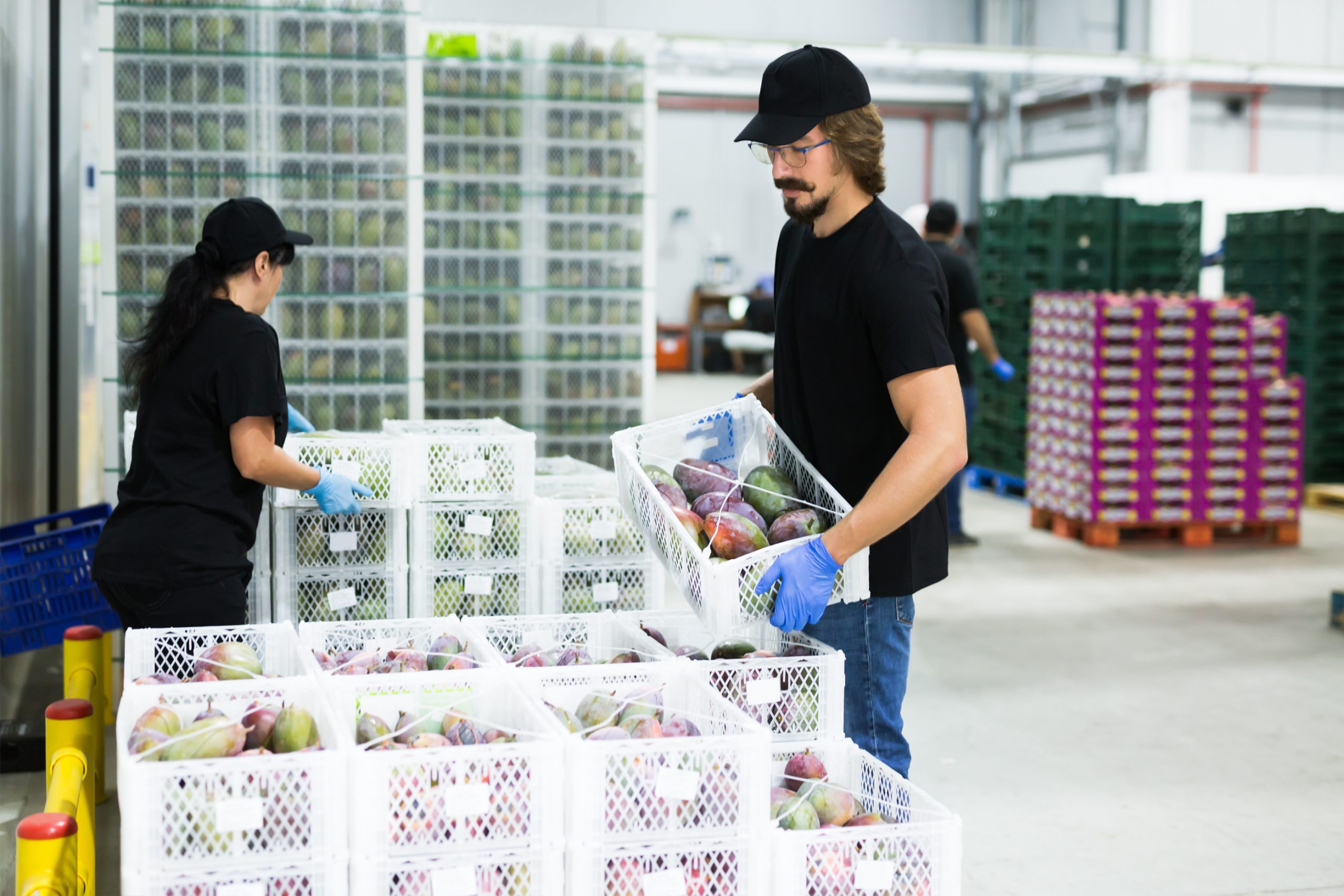
What are food-grade containers?
Simply, they are containers that store food safely for human consumption. The MHRA has deemed the material appropriate and safe for food storage. This list includes high-density polyethene (HDPE), Low-density polyethene (LDPE) and polyethene terephthalate (PET/PETE). These containers have minimal to no leeching of toxins for food, and the best way to transport food in strict temperatures and preserve freshness.
All food containers should be HPDE food-safe, this is because many plastic containers contain chemical-resistant properties. It is important to keep toxins from leaching into food, this is why all food containers need to be made from the previously stated materials. When it’s thinner resins, there is a possibility that they can leach into the food and cause contamination. LDPE ranks at a 4 on the recycling number chart, which makes it safe for products such as bread bags and produce bags.
When it comes to ‘food grade plastic’ they include numbers from 2, 4 and 5 for food storage. Code 1 is for single-use plastic which continues to be an environmental issue over recent years. This is because after this plastic is recycled and if it were to be used again, it would be dangerous and toxic. After its life span, it can not be used again which makes it the most dangerous plastic to our environment. Single-use plastic is the most harmful to the environment because it will typically end up in landfills.
Recycled products are at the foundation of Alison Handling’s plastic solutions, we pride ourselves on offering sustainable solutions. As we believe the environment should be looked after before its too late. We buy and sell used boxes which means you can purchase your items at an even lower price or if you have some boxes you wish to sell, you can even make some money too! This creates a sustainable solution and reduces the impact plastic has on the environment, by reusing and recycling plastic we can increase its life span which will prevent them from going into landfills.
It is vital to check which plastic is safe for food storage and how the grading system works. Take a look next time you buy water from your local supermarket, what grade is the bottle of water and what is the environmental impact it would have if you were to just throw it away.
So, what plastic numbers are safe for food storage? These numbers are 2, 4 and 5 as these will not leak toxic chemicals and will stand up to heat. However, which plastic should be avoided when it comes to food storage? Leaching chemicals such as BPA (Bisphenol A) PVC and Polystyrene (PS) will be ranked 3 and 6.
Aside from plastic many materials are also rising in popularity for storing food but do come at a cost hike. Glass, stainless steel, silicone and ceramic containers are safe for food storage. This is because they have properties such as heat resistance, no toxin leaks and microwave and dishwasher safe. This makes them perfectly suitable for food containers and will help improve food handling safety.
Why go for plastic? It is the most cost-effective for large-scale businesses to keep food stored safely for human consumption and the quantity of food being stored. Also, numbers ranked 2, 4 and 5 are all suitable for a variety of conditions when it comes to storing food in controlled temperatures that have to be air-sealed.
Why is it important to store food in food-safe containers?
We have touched on the importance of using the correct food-safe containers but how does this improve food handling?
Preventing bacteria growth
In short, you will be making sure food is stored safely, as raw produce chilling at the right temperature will prevent bacterial growth. This helps preserve food freshness especially when transporting food, especially if the supply chain is long. Food safety can be overlooked in a supply chain and throughout, but food-grade storage containers help when long journeys are required for either the import or exporting of fresh produce to preserve its freshness at the final destination.
Preventing food poisoning
Food poisoning most commonly occurs when food isn't stored at the correct temperature. The correct temperature is between 5c or below, or above 60c to avoid the temperature danger zone. Some foods are considered high-risk, this includes raw meat, dairy products, eggs, fruit salads, fruit and ready-to-eat food. It is important to note that uncooked food should be stored in sealed containers to avoid contamination.
These high-risk foods also make their way to kitchens for preparation, and freshness and quality are essential to business. Food-grade storage containers allow businesses to keep produce quality high in the catering industry, the correct food storage containers are essential for customer satisfaction. Catering food storage containers enable large quantities of food to be stored whilst keeping their quality high. Wholesale food storage containers allow for the same but at an increased amount. Food storage trays allow food to be shipped, moved and organised while keeping its freshness.
Durability
Durability is key when it comes to plastic containers for food, as food can be a heavy item to store particularly in large quantities. This is important when food is being transported as locally grown food is often shipped around the world for consumption, as optimal growing weather means some produce can only be grown in certain parts of the world.
With this in mind, the food containers need to be built to last when food is shipped/transported while keeping the food stored at the right temperature and no cross-contamination is caused. The import and export of food is a still growing market as new trade agreements are always being discussed between countries. Post-Brexit saw new regulations come into place regarding the transportation of food around countries inside the EU. Due to the UK leaving a lot of new laws came into effect that eased food transportation for the UK.
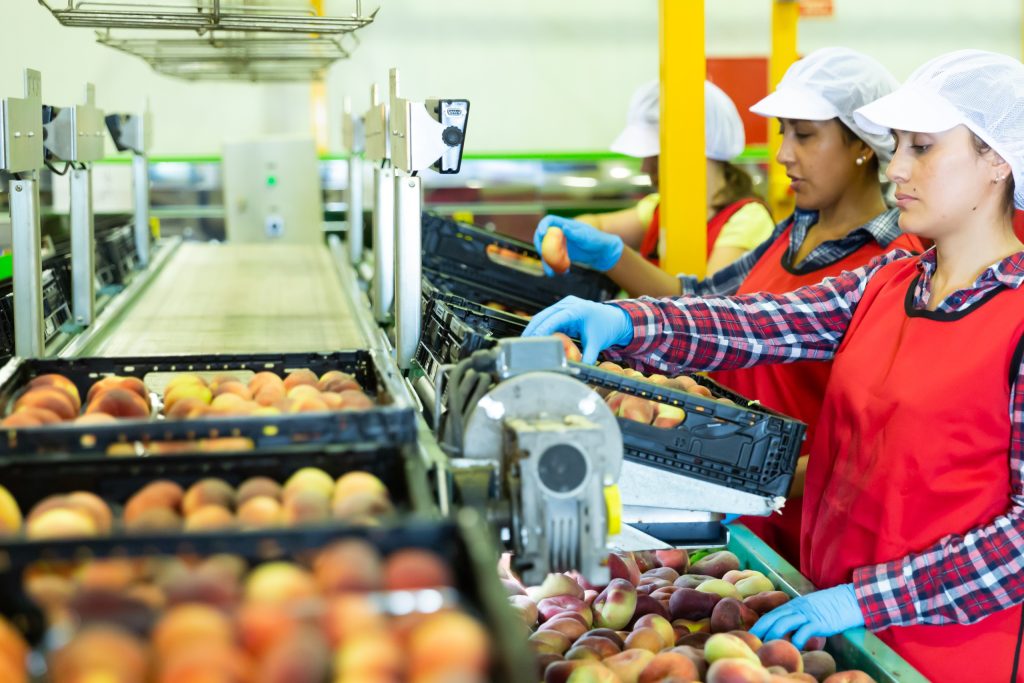
Types of food storage containers
Catering Food Storage Containers
Food-grade storage containers have taken over the average household due to growing online trends. However, this is great traction in making sure your food is kept as fresh as possible. Whether it's air sealed, max air flow or food storage trays that help with organisation.
This also translates into the catering world, as transportation to keep food fresh is important. Catering food storage containers are likely to be overlooked as short transport periods might not be considered that important, however, if the customer is dissatisfied with their delivery due to freshness or bacteria growth then you could have complaints and worse, illness from customers.
Hygiene ratings play a part in this and if you don’t have the correct catering food storage containers then you will have a lower rating. So what's best for catering? We find these catering food storage containers most suitable. They are most suitable for stacking glassware, plates, cutlery and moving around trays of food. The plastics are perfect for event hire companies, restaurants, pubs and cafes as they are sturdy, easy to clean, easy to handle and come in many different colours.
Wholesale Food Storage Containers
Wholesale food storage containers are perfect if you are a reseller of plastic storage solutions, Alison Handling has the best high-quality products in the industry. From business to business there will be different needs for the type of plastic boxes that you need. Retailers often find themselves needing plastic boxes, stacking containers, dollies, racks, trays, pallets, tubs, bins, trucks, dispensers, shelving, lockers, cabinets and way more. This is the range that we have at Alison Handling. Wholesale food storage containers are used in a variety of ways and competitive prices are a huge player in this to keep costs low.
Additionally, having a speedy delivery to make sure you are never running low, on both Alison Handling offers. Wholesale food containers are mostly bought in bulk and we ensure quality is kept to a high standard.
Food Storage Trays
Food storage trays are the most useful plastic product as they allow for trays to be stacked on top of each other. This is perfect for the transportation of large quantities and organising on plastic shelves.
They create max airflow and alternatively great proving trays for bakery goods. This type of versatile food storage tray comes in a multitude of colours too, if you find yourself baking a few different items, our different coloured trays help you to separate them without worry of cross-contamination. It is common that vegan food storage or gluten-free requires alternative storage methods or to be away from meat or dairy-included items.
Food Grade Storage Containers
There are many different ways in which food can be contaminated and based on what type of food it is it must be stored correctly. When it comes to the type of storage container being used, food-grade plastics are a must. This makes it vitally important that you choose the correct plastic when doing so, in order not to face harsh regulatory fines and worse, faulty human consumption.
When it comes to your food storage needs, Alison Handling will have you covered. Our wide range of products caters to the requirements of every industry including bakeries, catering and food manufacturing, and will help you store your food correctly. Enquire with us today to find out about how we can bring you food-grade storage containers that suit your business needs.




